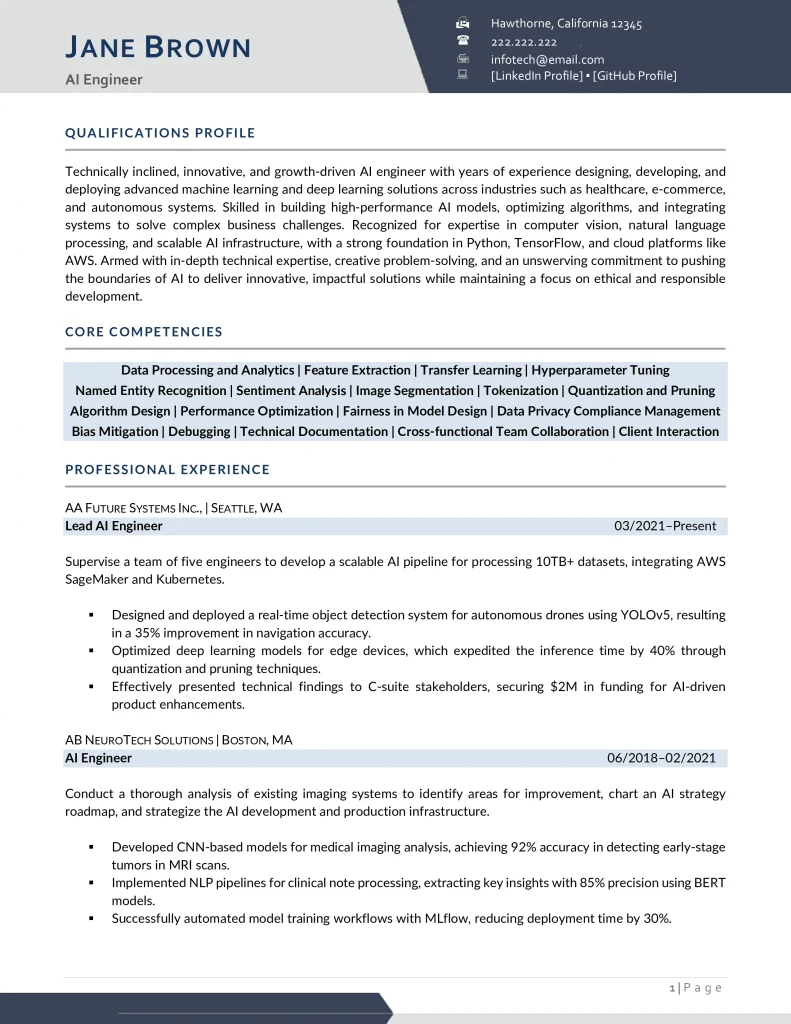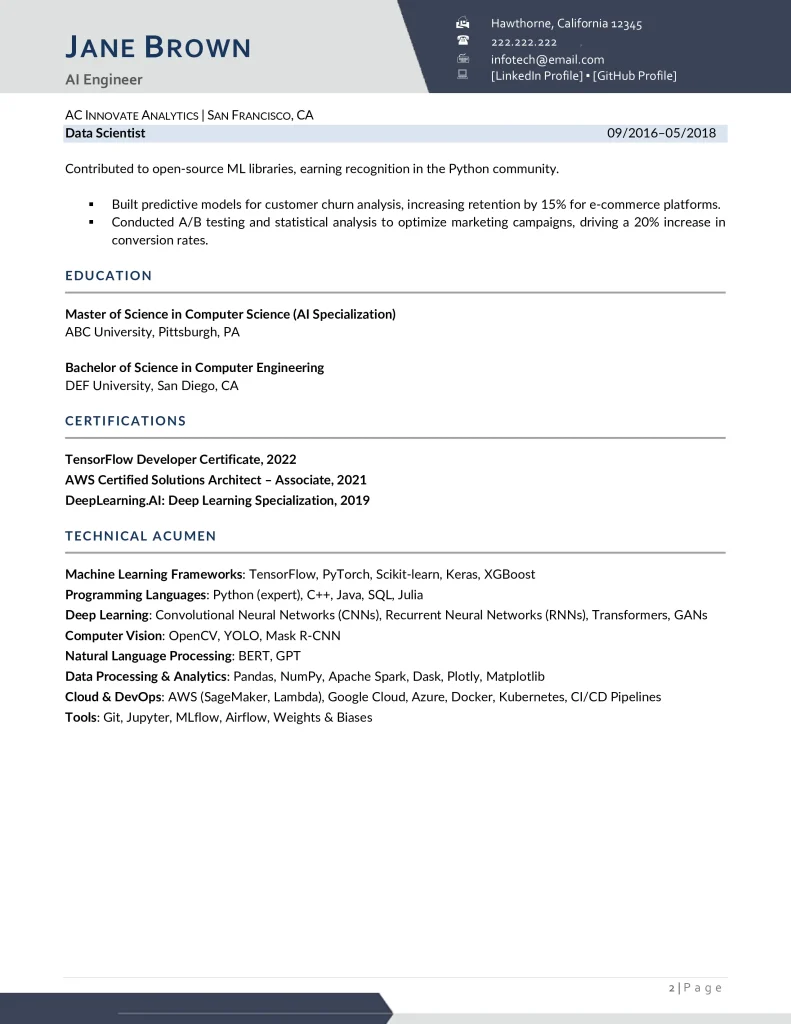Artificial intelligence is reshaping industries from healthcare to finance, and skilled professionals are driving this change. With demand and competition both rising, having a strong AI engineer resume example is crucial to stand out. Employers want more than just a list of technical skills—they look for proven achievements, measurable impact, and area of expertise that shows you can solve real-world problems.
This guide will show you how to create a standout resume by structuring each section effectively, using the right keywords, and showcasing accomplishments that matter. You’ll also see AI engineer resume examples that can inspire your own and help you get noticed by recruiters and hiring managers.
Why a Tailored AI Engineer Resume is Important
Many tech professionals make the mistake of using a generic resume when applying for AI roles. However, AI engineering is a niche field that requires specialized technical expertise and practical accomplishments. Hiring managers are not just looking for someone who knows Python or TensorFlow; they want to see real-world applications of these tools and how you’ve driven measurable business or research outcomes.
A tailored AI engineer resume helps you:
- Demonstrate technical depth: Highlighting your hands-on experience with machine learning frameworks, natural language processing (NLP), or computer vision shows recruiters that you can apply theory in practice.
- Showcase problem-solving ability: Employers value candidates who use AI to tackle real-world challenges, whether that’s reducing customer churn or building autonomous systems.
- Pass applicant tracking systems (ATS): Incorporating industry-relevant keywords ensures your resume isn’t filtered out before a human even sees it.
- Communicate results clearly: Numbers, percentages, and performance metrics give your resume credibility and make your contributions tangible.

Key Sections of an AI Engineer Resume
To create a strong AI engineer resume, you’ll need to strategically organize each section so recruiters can easily identify your qualifications. Here’s a breakdown of the essential components:
1. Contact Information
This should be clear, professional, and include:
- Full name
- Phone number
- Professional email address
- LinkedIn profile
- GitHub/portfolio link (essential for showcasing coding projects and open-source contributions)
Example:
Jane Doe | AI Engineer
Email: [email protected] | Phone: (123) 456-7890
LinkedIn: linkedin.com/in/janedoe | GitHub: github.com/janedoe
2. Professional Summary or Objective
This resume introduction gives a quick snapshot of your expertise, career focus, and unique strengths. Keep it concise but impactful, ideally within 3–5 sentences, to capture the recruiter’s attention right away.
Example (Mid-Level AI Engineer):
“AI Engineer with 5+ years of experience designing and deploying machine learning models in healthcare and finance. Proficient in Python, TensorFlow, and PyTorch, with a strong background in NLP and predictive analytics. Skilled at translating business challenges into AI-driven solutions that improve decision-making, reduce costs, and enhance user experience.”
Example (Entry-Level AI Engineer):
“Recent computer science graduate specializing in machine learning and deep learning. Hands-on experience with TensorFlow, Keras, and natural language processing through academic projects and internships. Passionate about applying AI to real-world challenges and eager to contribute to innovative product development teams.”
3. Technical Skills
AI engineering demands a diverse technical skill set. Organize this section into categories for readability.
Example:
- Programming Languages: Python, R, Java, C++
- Frameworks & Libraries: TensorFlow, PyTorch, Keras, Scikit-learn, OpenCV, Hugging Face Transformers
- AI & ML Techniques: Supervised/unsupervised learning, reinforcement learning, NLP, computer vision, deep learning
- Tools & Platforms: AWS, Google Cloud AI, Microsoft Azure, Docker, Kubernetes
- Data Handling: SQL, NoSQL, Pandas, NumPy, Hadoop, Spark
- Other: Git, REST APIs, Agile/Scrum
4. Professional Experience
This is the heart of your resume. Instead of listing responsibilities, emphasize achievements and measurable outcomes. Use the STAR method (Situation, Task, Action, Result) to guide your bullet points.
Example:
AI Engineer | XYZ Tech Solutions | San Francisco, CA | 2020 – Present
- Developed a deep learning NLP model that improved chatbot response accuracy by 35%, increasing customer satisfaction ratings.
- Implemented a fraud detection system using anomaly detection algorithms, reducing false positives by 20%.
- Collaborated with cross-functional teams to deploy scalable machine learning models on AWS, cutting processing time by 40%.
Machine Learning Engineer | DataLabs Inc. | New York, NY | 2017 – 2020
- Built and trained computer vision models for image recognition, achieving 92% accuracy on a 1M+ image dataset.
- Automated feature engineering processes, reducing model development time from 3 weeks to 1 week.
- Contributed to open-source libraries for deep learning optimization, resulting in over 1,000 GitHub stars.
5. Projects (Especially Important for Entry-Level Candidates)
If you’re new to AI engineering or don’t have extensive work experience, a project section can highlight your hands-on skills.
Example:
- AI-Powered Resume Parser: Designed an NLP application that extracts and categorizes skills, experience, and education from resumes with 88% accuracy.
- Self-Driving Car Simulation: Built a reinforcement learning model to control a simulated autonomous vehicle in Python, achieving collision avoidance rates of 95%.
- Stock Price Prediction Model: Created a time-series forecasting model using LSTM networks, improving prediction accuracy by 12% compared to baseline models.
6. Education
List your highest degree first, along with relevant coursework if you’re a recent graduate.
Example:
- Master of Science in Computer Science (AI Specialization) | Stanford University | 2020
- Relevant Coursework: Machine Learning, Neural Networks, Natural Language Processing, Big Data Analytics
- Bachelor of Science in Computer Engineering | University of California, Berkeley | 2018
7. Certifications (Optional but Valuable)
AI engineers benefit from showcasing certifications that prove advanced knowledge.
- TensorFlow Developer Certificate
- AWS Certified Machine Learning Specialty
- Microsoft Certified: Azure AI Engineer Associate
- Google Professional Machine Learning Engineer
- Coursera Deep Learning Specialization (Andrew Ng)
8. Publications & Contributions (Optional)
If you’ve published research papers, contributed to conferences, or written technical blogs, include them. This is especially useful for research-heavy AI roles.
Common Mistakes to Avoid on an AI Engineer Resume
Even skilled candidates can fall short if their resumes are poorly structured. Avoid these mistakes:
- Listing duties instead of achievements: Always focus on what you accomplished, not just what you were assigned.
- Overloading with technical jargon: Recruiters may not always be technical experts—balance depth with clarity.
- Ignoring ATS requirements: Use relevant AI keywords so your resume passes through initial screenings.
- Leaving out measurable impact: Numbers make your resume persuasive. Instead of “improved model performance,” say “improved model accuracy by 15%.”
- Too much length: Keep your resume ideally to one page (for early career) or two pages (for experienced professionals).
AI Engineer Resume Example
Here’s a complete AI engineer resume example to illustrate how everything ties together:


Download a free copy of the AI Engineer Resume Example.
Tips to Make Your AI Engineer Resume Stand Out
To stand out in the AI job market, your resume must highlight impact, collaboration, and key achievements. These tips will help you make your AI engineer resume more compelling to employers.
- Tailor your resume for each job: Use keywords and highlight projects that match the role. This shows employers you fit what they’re looking for.
- Show open-source contributions: Add any open-source projects you’ve worked on. It proves your skills and involvement in the AI field.
- Demonstrate collaboration: Mention how you worked with different teams. Employers like candidates who can work well with others.
- Include soft skills subtly: Highlight problem-solving, communication, and adaptability. These skills make you stand out beyond technical ability.
- Back up claims with metrics: Use numbers to show your results, like accuracy improvements or cost savings. Metrics make your impact clear and credible.

Turn Your AI Expertise into Career Opportunities
An AI engineer resume goes beyond listing technical skills—it’s a powerful tool to demonstrate how you apply AI to deliver real-world results. By highlighting measurable achievements, tailoring your resume for each role, and showcasing your impact, you position yourself as a strong candidate in one of today’s most competitive fields.
If you want a resume that truly stands out, our expert IT resume writers can help. We specialize in creating specialized resumes that highlight your technical expertise and achievements, making you more appealing to top employers. Contact us today to get a professionally written resume that boosts your chances of landing your next AI role.
Frequently Asked Questions
How long should an AI engineer resume be?
An AI engineer resume should ideally be one page for entry-level candidates and up to two pages for experienced professionals. The key is to keep it concise, focusing on relevant skills, measurable achievements, and projects that directly relate to the job you’re applying for.
Should I include a portfolio link in my AI engineer resume?
Yes, including a link to your GitHub, portfolio, or Kaggle profile is highly recommended. Recruiters in the tech industry value seeing real projects and code samples that demonstrate your hands-on skills.
How important are certifications for an AI engineer resume?
Certifications are not mandatory but can strengthen your resume. Specialized certifications, such as TensorFlow Developer or AWS Machine Learning, showcase your commitment to professional growth and validate your technical expertise.
Can I list academic projects on my AI engineer resume?
Absolutely. For students or career changers with limited professional experience, academic projects are a great way to demonstrate practical skills. Be sure to describe the tools used, your role, and the measurable results.
What soft skills should I highlight in an AI engineer resume?
In addition to technical expertise, employers value skills like problem-solving, teamwork, and adaptability. Highlighting these soft skills can help you stand out as a well-rounded candidate who can contribute beyond just coding.




